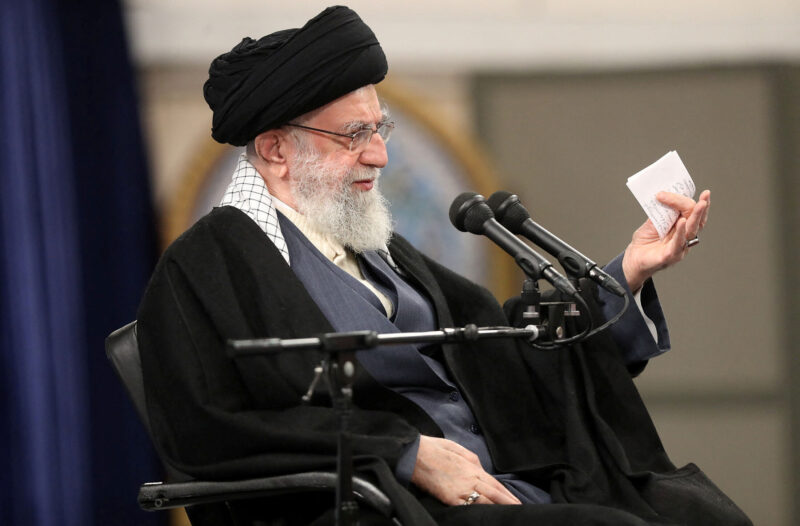DUBAI (Reuters) – Iran’s supreme leader said on Monday that the poisoning schoolgirls is an “unforgivable” crime that should be punished by death if deliberate, state TV reported, amid public anger over a wave of suspected attacks in schools.
Over 1,000 girls have fallen ill after being poisoned since November, according to state media and officials, with some politicians blaming religious groups opposed to girls’ education.
The poisonings have come at a critical time for Iran’s clerical rulers after months of protests since the death of a young woman held by police for flouting hijab rules.
“Authorities should seriously pursue the issue of students’ poisoning,” Ayatollah Ali Khamenei was quoted as saying by state TV. “If it is proven deliberate, those perpetrators of this unforgivable crime should be sentenced to capital punishment.”
The poisonings began in November in the holy Shi’ite Muslim city of Qom and spread to 25 of Iran’s 31 provinces, prompting some parents to take children out of school and protest.
Authorities have accused the Islamic Republic’s “enemies” of using the attacks to undermine the clerical establishment. But suspicions have fallen on hardline groups operating as self-declared guardians of their interpretation of Islam.
In Washington, President Joe Biden’s press secretary called the poisonings shameful on Monday.
“The possibility that girls in Iran are being possibly poisoned simply for trying to get an education is shameful, it’s unacceptable,” Karine Jean-Pierre said at a news briefing.
The White House called for an independent investigation to determine if the poisonings were related to protests, which would make it well within the mandate of the United Nations fact-finding mission on Iran.
‘GIRLS PAYING THE PRICE’
In 2014, people took to the streets of the city of Isfahan after a wave of acid attacks, which appeared to be aimed at terrorizing women who violated the strict Islamic dress code.
For the first time since the Islamic Revolution in 1979, schoolgirls have been joining the protests that spiralled after Mahsa Amini’s death in morality police custody.
Some activists have accused the establishment of orchestrating the poisonings in revenge.
“Now the girls of Iran are paying the price for fighting against the compulsory hijab (veil) and have been poisoned by the clerical establishment,” tweeted New York-based leading Iranian activist Masih Alinejad.
Fearing fresh impetus for protests, authorities have downplayed the poisonings. A judicial probe is under way, though no details of findings have yet been released.
At least one boys’ school has also been targeted in the city of Boroujerd, state media reported.
(Additional reporting by Elwely Elwelly in Dunai and Jeff Mason in Washington; Writing by Parisa Hafezi; Editing by Toby Chopra, Andrew Cawthorne and Sandra Maler)

